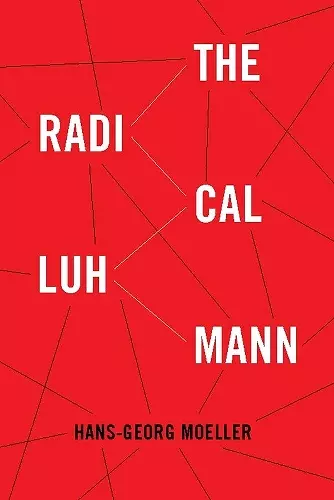The Radical Luhmann
Format:Hardback
Publisher:Columbia University Press
Published:25th Nov '11
Currently unavailable, and unfortunately no date known when it will be back

The Radical Luhmann is the most comprehensive and ironical reflection on Luhmann as grand theorist to date. Moeller brings welcome clarity to his evolutionary-ecological systems approach to social theory and argues provocatively that Luhmann's epistemological constructivism is sufficiently radical to merit the description of realism. From ontology to ethics, Moeller effectively demonstrates the synoptic breadth and deconstructive vigor of Luhmann's theory across classical and modern philosophy. -- Bruce Clarke, Texas Tech University
Niklas Luhmann (1927-1998) was a German sociologist and system theorist who wrote on law, economics, politics, art, religion, ecology, mass media, and love. Luhmann advocated a radical constructivism and antihumanism, or "grand theory," to explain society within a universal theoretical framework. Nevertheless, despite being an iconoclast, Luhmann is viewed as a political conservative. Hans-Georg Moeller challenges this legacy, repositioning Luhmann as an explosive thinker critical of Western humanism. Moeller focuses on Luhmann's shift from philosophy to theory, which introduced new perspectives on the contemporary world. For centuries, the task of philosophy meant transforming contingency into necessity, in the sense that philosophy enabled an understanding of the necessity of everything that appeared contingent. Luhmann pursued the opposite-the transformation of necessity into contingency. Boldly breaking with the heritage of Western thought, Luhmann denied the central role of humans in social theory, particularly the possibility of autonomous agency. In this way, after Copernicus's cosmological, Darwin's biological, and Freud's psychological deconstructions of anthropocentrism, he added a sociological "fourth insult" to human vanity. A theoretical shift toward complex system-environment relations helped Luhmann "accidentally" solve one of Western philosophy's primary problems: mind-body dualism. By pulling communication into the mix, Luhmann rendered the Platonic dualist heritage obsolete. Moeller's clarity opens such formulations to general understanding and directly relates Luhmannian theory to contemporary social issues. He also captures for the first time a Luhmannian attitude toward society and life, defined through the cultivation of modesty, irony, and equanimity.
The fact that Moeller has written such a convincing thesis is a major achievement in itself. It is made more impressive by the fact that he has, through the avoidance of sociological jargon and copious examples to illustrate his points, succeeded in conveying complex, abstract ideas in a way that makes them accessible to readers across a wide range of academic disciplines. -- Michael King, University of Reading Hans-Georg Moeller's timely and brilliant book marks a significant turn in the debate on Niklas Luhmann's great theory: the transition from the opposition pro/against to an external observation of the motives for enthusiasm or rejection. With his usual clarity and fascinating wealth of references, Moeller places Luhmann's theory at the heart of current intellectual reflection, indicating and demolishing the barriers that so far prevented its reception. -- Elena Esposito, Universita di Modena e Reggio Emilia Eminently readable and provocative... Monatshefte
ISBN: 9780231153782
Dimensions: unknown
Weight: unknown
184 pages